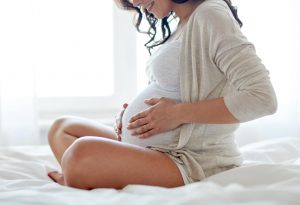In this Article
Pregnancy is the time when a baby is conceived and develops inside a woman’s body. It lasts about 37 to 40 weeks and is divided into three trimesters of around 12 weeks each. Menopause signals the end of female reproductive ability. The woman stops ovulating and having menstrual periods. It is the end of a woman’s fertility.
Pregnancy and menopause share several symptoms. With women preferring to give birth at a later age, it may be difficult for women to determine if their initial symptoms are caused by pregnancy or menopause. This article explains the similarities and the differences between the two.
Symptoms Common to Both Pregnancy and Menopause
During pregnancy, the body goes through a lot of physical and hormonal changes that cause various symptoms. Similarly, menopause also causes changes in the body. Most women experience menopause in their late-40s to mid-50s. Before that, they go through perimenopause, which is an onset of symptoms before the actual menopause. Perimenopause can begin in the mid to late 40s and last anywhere between 2 to 8 years.
Here are the symptoms that are common to both pregnancy and menopause:
1. Changes in Menstrual Cycle
Both pregnant women and women in perimenopause will experience changes in their menstrual cycles. Missed periods are usually an indicator of pregnancy, while irregular periods are an indicator of the start of menopause. Signs of irregular periods are spotting between periods, changes in blood flow, and shorter or longer periods.
2. Mood Swings
Hormonal increases and decreases can cause mood swings in both perimenopause and pregnancy. During pregnancy, the hormonal changes may make you feel very emotional and tearful. During perimenopause, women may be irritable, gloomy or depressed.
3. Headaches
Both pregnant women and women in perimenopause suffer headaches. The loss of oestrogen in menopause causes headaches. The increase in levels of the hormones oestrogen, progesterone, and hCG (Human Chorionic Gonadotropin) cause headaches during pregnancy.
4. Weight Changes
Both pregnancy and menopause cause changes in body weight. Weight gain is gradual in pregnancy, with the woman slowly gaining weight as the baby grows. During menopause, hormonal changes cause weight gain particularly around the abdomen. A slowdown in metabolism during menopause makes it difficult for women to sustain a healthy weight.
5. Changes in Sex Drive
Changes in libido are common in both pregnancy and menopause. However, women are more likely to have a decreased libido during menopause, while their sex drive may increase or decrease during pregnancy.
6. Cramps and Bloating
Hormonal changes may cause cramping and bloating in early pregnancy. Similarly, bloating and cramping also occurs during menopause. Cramping during menopause can be an indicator that the menstrual period is about to begin.
7. Night Sweats and Hot Flashes
Hot flashes and night sweats are usual symptoms of menopause. However, women can experience night sweats and hot flashes in early pregnancy, too. A hot flash is a rush of heat that can cause sweating and flushed, reddish skin, especially on the face.
8. Incontinence
Increased blood volume in pregnancy puts pressure on the kidneys since they have to process higher volumes of fluids. This increases the urge to urinate in most women, and you might find yourself going to the loo more often! Also, the growing uterus puts pressure on the bladder, causing incontinence in early pregnancy. During menopause, loss of muscle and tissue tone causes incontinence.
9. Sleep Problems and Fatigue
In pregnancy, high levels of progesterone cause fatigue which cause women to feel sleepy. In perimenopause, women have trouble falling asleep and staying asleep through the night. This leads to sleep deprivation and tiredness.
Symptoms Occurring Only in Pregnancy
While there are overlapping symptoms of pregnancy and menopause, the following symptoms, specific to pregnancy will make it easier to understand your own condition.
1. Nausea and Vomiting
Nausea and vomiting in pregnancy are called morning sickness. It is caused by high levels of the pregnancy hormone hCG. This takes place during the first trimester. Although it is called ‘morning’ sickness, nausea and vomiting can occur at any time of the day or night. The morning sickness usually subsides after the third month of pregnancy.
2. Soreness and Sensitivity in Breasts
The hormonal changes in early pregnancy make the breasts very sensitive and sore. This disappears once the body adjusts to the hormonal surges.
3. Constipation
Increase in progesterone levels during pregnancy relax the muscles throughout the body. This slows down the digestive system and leads to constipation.
4. Hypersensitivity to Foods
During pregnancy, women experience both food cravings as well as food aversions. This is due to high levels of the pregnancy hormone hCG.

Symptoms Occurring Only in Menopause
1. Loss of Bone Density
Reduced levels of oestrogen in the body during perimenopause cause a decrease in bone density. This leads to a risk of osteoporosis, a medical condition in which bones become fragile and brittle from loss of tissue. To prevent loss of bone mass, women in their late 40s are advised to take calcium and vitamin D supplements.
2. Dryness in the Vagina
Decreased oestrogen levels also cause a reduction in elasticity and lubrication of the vagina. This can cause bleeding after sex and make sex uncomfortable.
3. Reduced Fertility
Menopause signals the end of female fertility. Women approaching menopause stop ovulating regularly and have lower chances of becoming pregnant. However, menstruating women can still become pregnant.
4. Cholesterol Problems and Risk of Heart Disease
Lower oestrogen levels cause an increase in LDL cholesterol (low-density lipoprotein), also called bad cholesterol. This increases the risk of heart disease and stroke.

How are Pregnancy and Menopause Diagnosed?
Both pregnancy and menopause can be correctly diagnosed and confirmed by a doctor. If you are in your 40s and are experiencing symptoms that may be caused by either pregnancy or menopause, you can follow these steps to diagnose it correctly:
1. Diagnosis of Pregnancy
If you have a doubt whether it is menopause or pregnancy that is causing your symptoms, take a home pregnancy test to confirm it. Make sure you confirm the result with your doctor to make sure the home pregnancy test did not give you a false positive or negative result. The doctor will confirm your pregnancy with a blood or urine test and a pregnancy ultrasound scan. The ultrasound scan is the method that most doctors use for confirming a viable pregnancy.
2. Diagnosis of Menopause
If you do not know whether your symptoms are caused by pregnancy or menopause, confirm with your doctor. This confirmation is done via a blood and urine tests to rule out pregnancy. The doctor will also do blood tests to determine levels of the hormones oestrogen and progesterone. He will also consider all the symptoms a woman experiences, including changes in menstruation, to diagnose menopause.
Menopause and pregnancy have several common symptoms. Due to this, women who are in their 40s may have difficulties determining if their symptoms are caused by pregnancy or menopause. The way to confirm this is by consulting your doctor who will do diagnostic tests to determine the cause of your symptoms. If the cause is pregnancy, the woman will need to start eating healthy, taking prenatal vitamins, and prepare for childbirth. If it is menopause, the woman will have to take calcium and vitamin D supplements, exercise regularly, eat healthily, and consider hormone replacement therapy to reduce the symptoms of menopause.








